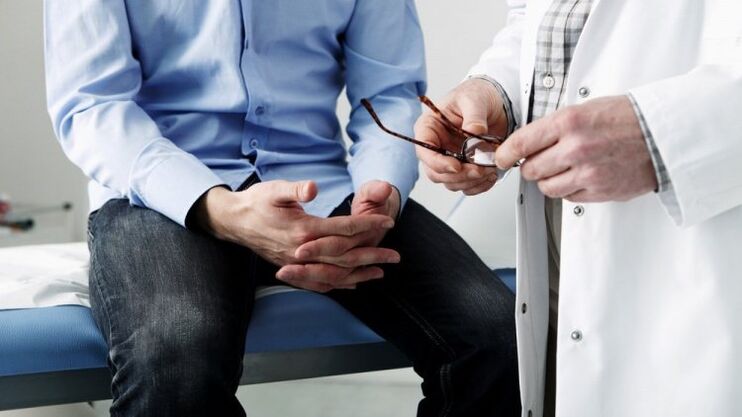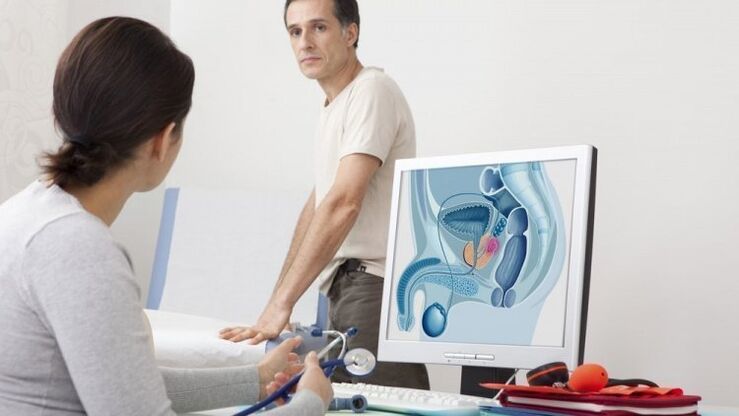Inflammatory processes in the prostate gland (prostate gland) are often called prostatitis. The prostate gland is a male-specific organ located in the pelvis below the bladder. It performs several functions: the prostate gland secretes part of the sperm, which at the time of sexual stimulation acts as a sphincter - it blocks the entrance to the bladder.
Prostatitis: the urgency of the problem
According to US researchers, prostatitis is detected in about 25% of patients with urinary problems. And overall, about 9% of the global male population has it.
In one country, this pathology includes about 35% of young men, and among them 7-30% of prostatitis has complex forms and ranks first among diseases of the male reproductive system. This is most likely due to the mentality of our population - only a small percentage of men seek timely qualified medical help. Often, the signs of prostatitis are ignored until the situation becomes really serious.
Although the disease is not seriously life-threatening, it can complicate a man's life, plunge him into severe depression, depriving him of simple pleasures andseverity, rendering him infertile.
Acute and chronic prostatitis

According to the classification adopted in 1995 in the United States, prostatitis is divided into the following forms:
- Acute bacterial prostatitis;
- Chronic bacterial prostatitis;
- Chronic bacterial prostatitis;
- Asymptomatic prostatitis.
Acute prostatitis is the result of a bacterial attack on the gland. These can be bacteria, viruses, protozoa, and even fungi. Treatment of acute prostatitis is based on the use of antibacterial drugs.
Chronic prostatitis, unrelated to infectious agents, deserves special attention, as it occurs 8 times more frequently than bacterial prostatitis, of unknown origin, and causes prostatitis. There is a lot of controversy about the method of treatment.
Thus, chronic prostatitis, unrelated to infection, has an unknown etiology. Several factors have been identified that contribute to slowing the development of inflammation in the prostate gland.
- Sedentary lifestyle (truck driver, office worker);
- Disorders in intimate life: intercourse too rarely or too often, interrupted intercourse, sexual frigidity;
- Constipation;
- Hypothermia and frequent infectious diseases;
- Sexual infection and the presence of other urological diseases in history;
- Weakened immunity and severe chronic diseases.
Signs of prostatitis: mixed opinions of urologists

Acute prostatitis, as a rule, is accompanied by symptoms of general intoxication: fever, loss of strength, decreased mood, weakness, etc. v. A man complains of pain in his lower abdomen or back, scrotum, or groin. Pain also manifests itself when urinating, defecating, and after intercourse. The man may detect gray or bluish-gray discharge from the urethra, with blood in the semen.
If the opinion of urologists coincides with acute prostatitis, then a dispute arises with the clinical manifestations of chronic prostatitis.
Most experts consider the main symptom of chronic prostatitis to be erectile dysfunction. We hear about this on TV screens advertising anti-prostatitis drugs. Many men associate their failure in bed with prostatitis, prescribing themselves with advertised drugs.
Research doctor and interventional doctor at the Institute of Urology considers this a far-fetched misrepresentation of half of men to advertise the drug. According to him, chronic prostatitis does not cause erectile dysfunction, and episodes of impotence in men are only psycho-emotional and self-hypnotic masses. Treatment of erectile dysfunction in this case is reduced to a conversation with a psychotherapist.
The doctor noted that recently prostatitis has become a commercial disease for which careless doctors make money. The applicant is diagnosed with a non-existent disease, a lot of expensive diagnostic and treatment procedures are prescribed, then the patient finds out the symptoms on their own, waits for the manifestations, and they do not let themselves be. wait.
The indisputable sign of prostatitis is pelvic pain, pain during urination and after ejaculation. Inflamed, enlarged glands can compress nearby organs, leading to constipation and difficulty urinating. Pain after ejaculation is caused by the constriction of the vas deferens, after the sperm ejaculate and the contraction in the inflamed duct will lead to pain.
The quality of sex life is violated: the man reports that he has little interest in sex life, and pleasure has been "wiped out", with no sense of satisfaction from closeness. Painful ejaculation is another reason to refuse intimacy.
The development of infertility with chronic inflammation of the prostate gland is associated with changes in the seminal fluid, which is inevitable, because the chemical composition of the secreted prostate changes. Sperm count decreases, pathological forms or dead sperm appear.
How to maintain men's health?

A man's health is in the hands of a competent urologist! As soon as you notice the signs of prostatitis, you need to see a doctor. The treatment is lengthy and complex. Depending on the etiology, it may include antibiotic therapy, anti-inflammatory and decongestant medications, peptide modifiers, pain relievers, prostate massage, and physical therapy.
It is believed that married men are less prone to prostatitis. Regular sex life with one partner does not create opportunities for the development of inflammatory and stagnant processes in the gland. So marriage and fidelity to one's spouse, no matter how clichéd it may sound, is a preventative measure against prostatitis.

























